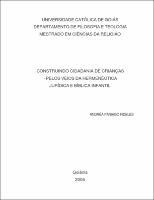| Compartilhamento |


|
Use este identificador para citar ou linkar para este item:
http://tede2.pucgoias.edu.br:8080/handle/tede/816Registro completo de metadados
| Campo DC | Valor | Idioma |
|---|---|---|
| dc.creator | Fideles, Andréa Paniago | - |
| dc.creator.Lattes | http://buscatextual.cnpq.br/buscatextual/visualizacv.do?id=K4735653H8 | por |
| dc.contributor.advisor1 | Reimer, Ivoni Richter | - |
| dc.contributor.advisor1Lattes | http://buscatextual.cnpq.br/buscatextual/visualizacv.do?id=K4700933Y3 | por |
| dc.contributor.referee1 | Santos, Pedro Sérgio dos | - |
| dc.contributor.referee1Lattes | http://buscatextual.cnpq.br/buscatextual/visualizacv.do?id=K4723199A6 | por |
| dc.contributor.referee2 | Reimer, Haroldo | - |
| dc.contributor.referee2Lattes | http://buscatextual.cnpq.br/buscatextual/visualizacv.do?id=K4700933E6 | por |
| dc.date.accessioned | 2016-07-27T13:47:57Z | - |
| dc.date.available | 2006-08-09 | - |
| dc.date.issued | 2005-02-28 | - |
| dc.identifier.citation | FIDELES, Andréa Paniago. Constructing citizenship from children all the way through the Legal Hermeneutic and Infant(ile) Biblical Hermeneutic.. 2005. 202 f. Dissertação (Mestrado em Ciências Humanas) - Pontifícia Universidade Católica de Goiás, Goiânia, 2005. | por |
| dc.identifier.uri | http://localhost:8080/tede/handle/tede/816 | - |
| dc.description.resumo | Esta dissertação tem por escopo ajudar a reconstruir cidadania de crianças. Para tanto, analisa os termos gregos bréfos, corásion, país, téknon, thygáter, népios e huiós, nos textos do Novum Testamentum Graece, na tentativa de posicionar a criança como sujeito hermenêutico, jurídico e religioso nas dimensões temporais, espaciais e sociais. Num primeiro momento, aprofundamos na realidade da infância brasileira, pela Hermenêutica Jurídica na expressão do princípio de prioridade absoluta que a criança detêm no ordenamento jurídico pátrio. Num segundo momento, adentramos nos mundos patriarcais da região do Mar Mediterrâneo, sobretudo quanto a história de crianças na Grécia, Roma e Palestina antigas, questionando sobre a posição social que a infância ocupou até o séc. I dC, pelo importante trânsito entre estas culturas, apontando diferenças e jungindo semelhanças de tratamento com nossas crianças, e assim, ajudando a construir cidadania. Depois de termos aprofundado na realidade e no contexto que serviram de pano de fundo para os Evangelhos serem vividos e testemunhados, que nos auxiliam a compreender nossas raízes patriarcais (legais, culturais) greco-romanas e judaicas, poderemos finalmente contextualizar a realidade de nossas crianças e realizar a releitura a que nos propomos: ler a bíblia com olhos de crianças na formulação da Hermenêutica Bíblica Infantil. Percebemos que a realidade sofrida das crianças contemporâneas de Jesus e do mundo antigo não é tão distante de nossas crianças no Brasil de hoje. A intenção é desamarrar a criança das exegeses e hermenêuticas que excluem dos seus discursos a infância, pelas leituras e tradições adultocêntricas, patriarcais e androcêntricas, que invizibilizam as crianças nos textos bíblicos do Segundo Testamento. | por |
| dc.description.abstract | The objective of this dissertation is to contribute towards the reconstruction of the concept of child citizenship. There for, we research the use of the greek words bréfos, corásion, país, téknon, thygáter, népios e huiós, in the texts of the Novum Testamentum Graece, trying to observe the child as an hermeneutic, legal and religious subjects, in different dimensions of time, geographic space and social environment. Then we delve into the reality of brazilian childhood, using Legal Hermeneutics as expressed by the absolute priority principle` that the child holds in our legal system. Afterwards, investigate the patriarchal worlds, of ancient civilizations of the Mediterranean Sea, focusing on Greek, Roman and Palestine cultures, to reelaborate histories of children, questioning about their social status until the first century, for its importance in cultural interchange, pointing out differences in and merging similarities conditions of children treatment practices, thus helping construct citizenship. After studing the ancient context as backdrop to those who witnessed and lived the events described in the Gospel, that helps we understand our patriarchies roots (legal, cultural) greco-romans and jewish, we ll be able to contextualize the reality of the bible child and finally carry through the new perspective we want to present: read the Bible with eyes of a child in order to formulate the Infant(ile) Biblical Hermeneutic. We notice the suffering reality of biblical child and the ancient world are not that far from our brazilian children nowadays. The intention is to untie the child from those exegesis and hermeneutics that by childhood excluding speeches from their discourse, resulting from adultcentered, patriarchal and androcentric interpretations and traditions, makes children invisible in the New Testament scriptures. | eng |
| dc.description.provenance | Made available in DSpace on 2016-07-27T13:47:57Z (GMT). No. of bitstreams: 1 Andrea Paniago Fideles.pdf: 1514938 bytes, checksum: 2994445fd63ba82d7bd558689b110a1b (MD5) Previous issue date: 2005-02-28 | eng |
| dc.format | application/pdf | por |
| dc.thumbnail.url | http://localhost:8080/tede/retrieve/3527/Andrea%20Paniago%20Fideles.pdf.jpg | * |
| dc.language | por | por |
| dc.publisher | Pontifícia Universidade Católica de Goiás | por |
| dc.publisher.department | Ciências Humanas | por |
| dc.publisher.country | BR | por |
| dc.publisher.initials | PUC Goiás | por |
| dc.publisher.program | Ciências da Religião | por |
| dc.rights | Acesso Aberto | por |
| dc.subject | CIDADANIA | por |
| dc.subject | CRIANÇA | por |
| dc.subject | BÍBLIA | por |
| dc.subject.cnpq | CNPQ::CIENCIAS HUMANAS::TEOLOGIA | por |
| dc.title | CONSTRUINDO CIDADANIA DE CRIANÇAS - PELOS VEIOS DA HERMENÊUTICA JURÍDICA E BÍBLICA INFANTIL | por |
| dc.title.alternative | Constructing citizenship from children all the way through the Legal Hermeneutic and Infant(ile) Biblical Hermeneutic. | eng |
| dc.type | Dissertação | por |
| Aparece nas coleções: | Mestrado em Ciências da Religião | |
Arquivos associados a este item:
| Arquivo | Descrição | Tamanho | Formato | |
|---|---|---|---|---|
| Andrea Paniago Fideles.pdf | 1,48 MB | Adobe PDF |  Baixar/Abrir Pré-Visualizar |
Os itens no repositório estão protegidos por copyright, com todos os direitos reservados, salvo quando é indicado o contrário.




